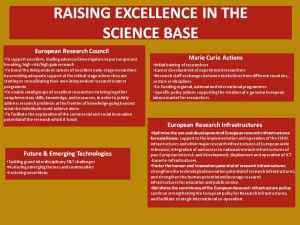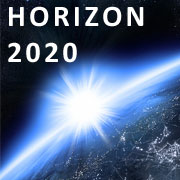Draft proposals for Horizon 2020 have been released. These are in no way the finalised documents so please bear that in mind when you’re reviewing this information! The latest proposals suggest that objectives will be focused on three areas:
 1. Tackling Societal Challenges: focusing on health, demographic changes and wellbeing; food security and bio-based economy; secure, clean and efficient energy; smart, green and integrated transport; resource efficiency and climate; and inclusive, innovative and secure societies.
1. Tackling Societal Challenges: focusing on health, demographic changes and wellbeing; food security and bio-based economy; secure, clean and efficient energy; smart, green and integrated transport; resource efficiency and climate; and inclusive, innovative and secure societies.
2. Creating Industrial Leadership & Competitive Frameworks: focusing on leadership in enabling and industrial technologies (ICT, nanotechnology, materials and production, biotechnology, and space); innovation in SMEs; and access to risk finance.
 3. Raising Excellence in the Science Base: European Research Council (ERC); Future and Emerging Technologies (FET); Marie Curie; and European research infrastructures.
3. Raising Excellence in the Science Base: European Research Council (ERC); Future and Emerging Technologies (FET); Marie Curie; and European research infrastructures.
There are likely to be a range of funding schemes, used across the whole of the programme, including:
- Research and innovation grants covering all sizes and types of projects)
- Training and mobility grants
- Programme co-funding grants
- Support grants
- Prizes
- Grants to public procurement of innovation
- Procurements
- Debt finance and equity investments
When I have further updates on the possible structure of FP7 I will add to the blog.




















 SPROUT: From Sustainable Research to Sustainable Research Lives
SPROUT: From Sustainable Research to Sustainable Research Lives BRIAN upgrade and new look
BRIAN upgrade and new look Seeing the fruits of your labour in Bangladesh
Seeing the fruits of your labour in Bangladesh Exploring Embodied Research: Body Map Storytelling Workshop & Research Seminar
Exploring Embodied Research: Body Map Storytelling Workshop & Research Seminar Marking a Milestone: The Swash Channel Wreck Book Launch
Marking a Milestone: The Swash Channel Wreck Book Launch ECR Funding Open Call: Research Culture & Community Grant – Application Deadline Friday 12 December
ECR Funding Open Call: Research Culture & Community Grant – Application Deadline Friday 12 December MSCA Postdoctoral Fellowships 2025 Call
MSCA Postdoctoral Fellowships 2025 Call ERC Advanced Grant 2025 Webinar
ERC Advanced Grant 2025 Webinar Update on UKRO services
Update on UKRO services European research project exploring use of ‘virtual twins’ to better manage metabolic associated fatty liver disease
European research project exploring use of ‘virtual twins’ to better manage metabolic associated fatty liver disease